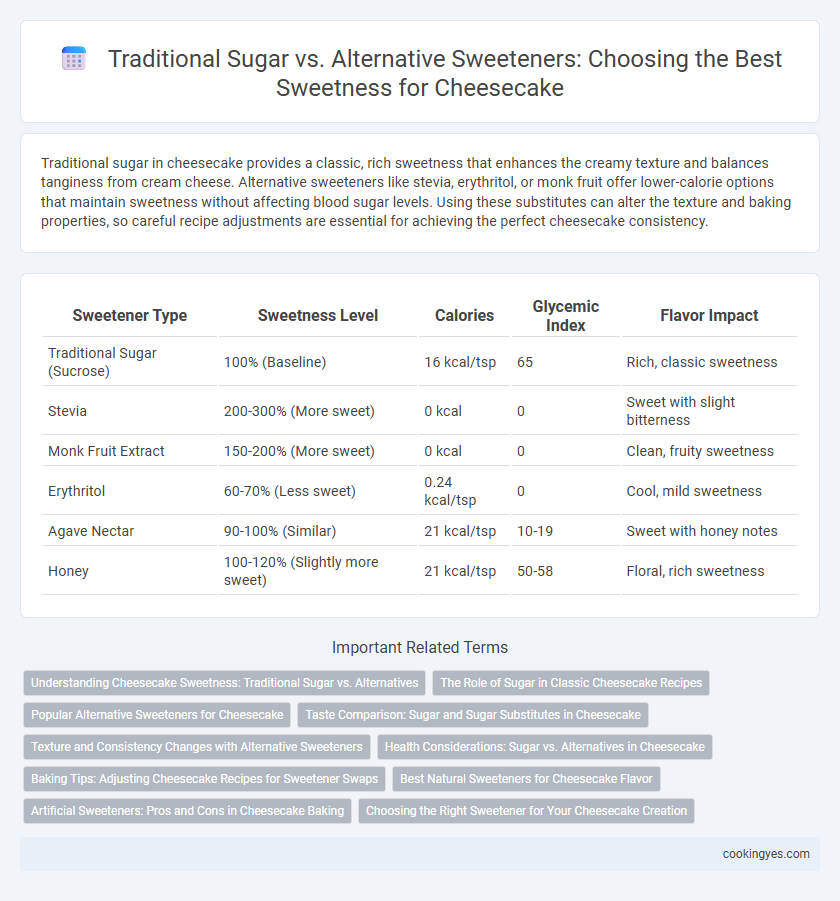Traditional sugar in cheesecake provides a classic, rich sweetness that enhances the creamy texture and balances tanginess from cream cheese. Alternative sweeteners like stevia, erythritol, or monk fruit offer lower-calorie options that maintain sweetness without affecting blood sugar levels. Using these substitutes can alter the texture and baking properties, so careful recipe adjustments are essential for achieving the perfect cheesecake consistency.
Table of Comparison
| Sweetener Type | Sweetness Level | Calories | Glycemic Index | Flavor Impact |
|---|---|---|---|---|
| Traditional Sugar (Sucrose) | 100% (Baseline) | 16 kcal/tsp | 65 | Rich, classic sweetness |
| Stevia | 200-300% (More sweet) | 0 kcal | 0 | Sweet with slight bitterness |
| Monk Fruit Extract | 150-200% (More sweet) | 0 kcal | 0 | Clean, fruity sweetness |
| Erythritol | 60-70% (Less sweet) | 0.24 kcal/tsp | 0 | Cool, mild sweetness |
| Agave Nectar | 90-100% (Similar) | 21 kcal/tsp | 10-19 | Sweet with honey notes |
| Honey | 100-120% (Slightly more sweet) | 21 kcal/tsp | 50-58 | Floral, rich sweetness |
Understanding Cheesecake Sweetness: Traditional Sugar vs. Alternatives
Traditional sugar, primarily granulated white sugar, contributes to cheesecake's classic creamy texture and balanced sweetness by caramelizing during baking. Alternative sweeteners such as stevia, erythritol, and monk fruit provide lower-calorie options while affecting texture and sweetness intensity differently, often requiring recipe adjustments to maintain cheesecake integrity. Understanding the chemical and sensory impacts of both traditional sugar and sweeteners is essential for achieving the desired flavor profile and mouthfeel in cheesecake recipes.
The Role of Sugar in Classic Cheesecake Recipes
Sugar provides essential structure and moisture in classic cheesecake recipes, contributing to the creamy texture and balanced sweetness. Traditional granulated sugar caramelizes slightly during baking, enhancing flavor depth and supporting the smooth consistency characteristic of authentic cheesecakes. Alternative sweeteners such as erythritol or stevia can alter texture and moisture retention, often requiring recipe adjustments to maintain the ideal mouthfeel and sweetness balance.
Popular Alternative Sweeteners for Cheesecake
Popular alternative sweeteners for cheesecake include stevia, erythritol, and monk fruit, known for providing sweetness without the added calories or blood sugar spikes associated with traditional sugar. Erythritol, a sugar alcohol, closely mimics the texture and taste of sugar, making it a preferred choice in low-carb and keto cheesecake recipes. Monk fruit extract offers a natural, zero-calorie sweetness with antioxidant properties, appealing to health-conscious bakers seeking to reduce refined sugar intake.
Taste Comparison: Sugar and Sugar Substitutes in Cheesecake
Traditional sugar provides a rich, caramelized sweetness and smooth texture that enhances the creamy flavor of cheesecake, creating a classic indulgence. Alternative sweeteners like stevia, erythritol, and monk fruit offer lower-calorie options but can introduce slight aftertastes or impact the dessert's moisture and texture. Taste tests reveal that while sugar substitutes may satisfy dietary needs, they often lack the complex sweetness and mouthfeel that sugar imparts to authentic cheesecake recipes.
Texture and Consistency Changes with Alternative Sweeteners
Traditional sugar in cheesecake contributes to a smooth, creamy texture and stable consistency by aiding in structure and moisture retention. Alternative sweeteners like erythritol or stevia may alter the texture, often resulting in a denser or grainier cheesecake due to differences in crystallization and moisture absorption. Adjusting the balance of ingredients when using sugar substitutes is essential to maintain the desired mouthfeel and consistency.
Health Considerations: Sugar vs. Alternatives in Cheesecake
Traditional sugar in cheesecake provides a familiar, creamy sweetness but contributes to higher calorie content and blood sugar spikes, posing challenges for those with diabetes or weight management goals. Alternative sweeteners like stevia, erythritol, or monk fruit offer lower glycemic impact and fewer calories, making them healthier choices without significantly altering texture or flavor. Choosing sweeteners depends on balancing health benefits and desired taste, with alternatives increasingly favored in diabetic-friendly or low-carb cheesecake recipes.
Baking Tips: Adjusting Cheesecake Recipes for Sweetener Swaps
When adjusting cheesecake recipes for sweetener swaps, traditional sugar provides consistent texture and caramelization essential for a creamy, smooth finish. Alternative sweeteners like erythritol or stevia require precise measurement adjustments since they differ in sweetness intensity and can affect the batter's moisture and structure. Incorporate gradual testing to balance sweetness while maintaining the cheesecake's ideal mouthfeel and baking time.
Best Natural Sweeteners for Cheesecake Flavor
Traditional sugar provides a classic, clean sweetness that enhances the creamy texture and rich flavor of cheesecake without overpowering it. Natural sweeteners such as honey, maple syrup, and agave nectar offer complex flavor profiles that complement cheesecake by adding subtle floral, caramel, or fruity notes. Using these alternatives not only maintains the desired sweetness but also introduces unique taste dimensions, improving the overall flavor experience and appealing to health-conscious consumers seeking lower glycemic options.
Artificial Sweeteners: Pros and Cons in Cheesecake Baking
Artificial sweeteners like sucralose and aspartame offer reduced calorie content and lower glycemic impact in cheesecake baking, making them suitable for diabetic and calorie-conscious consumers. Their intense sweetness requires careful dosage to avoid bitter aftertaste or texture changes in the final cheesecake. However, some artificial sweeteners may affect the cheesecake's rise and moisture retention, potentially altering traditional creamy texture and mouthfeel.
Choosing the Right Sweetener for Your Cheesecake Creation
Traditional sugar provides a classic, rich sweetness that enhances the creamy texture of cheesecake while ensuring predictable baking results. Alternative sweeteners such as stevia, erythritol, or monk fruit offer lower-calorie options that can reduce glycemic impact but may slightly alter the texture and flavor profile. Selecting the right sweetener depends on balancing taste preferences, dietary needs, and desired consistency to create the perfect cheesecake experience.
Traditional sugar vs alternative sweeteners for cheesecake sweetness Infographic

 cookingyes.com
cookingyes.com